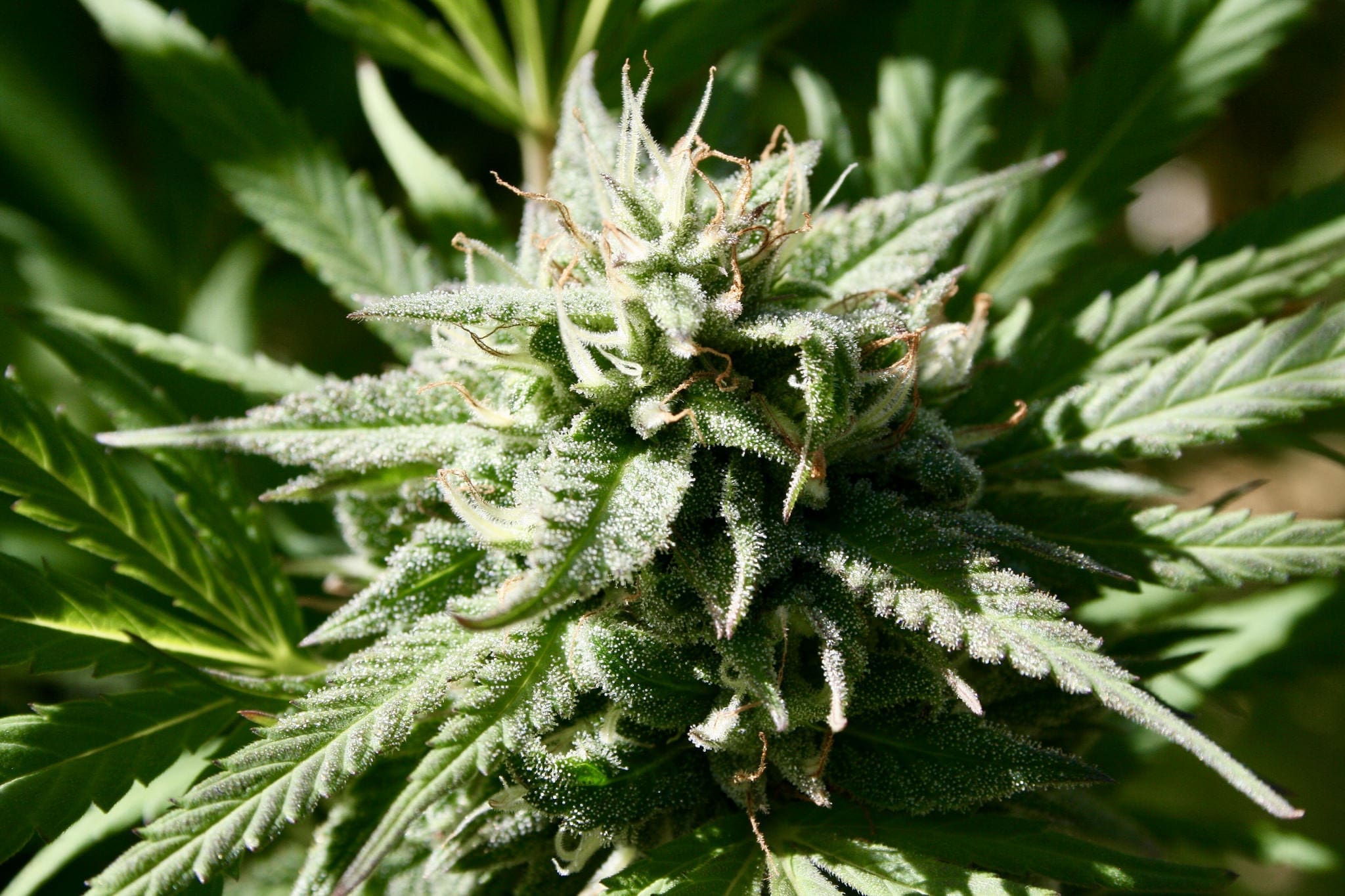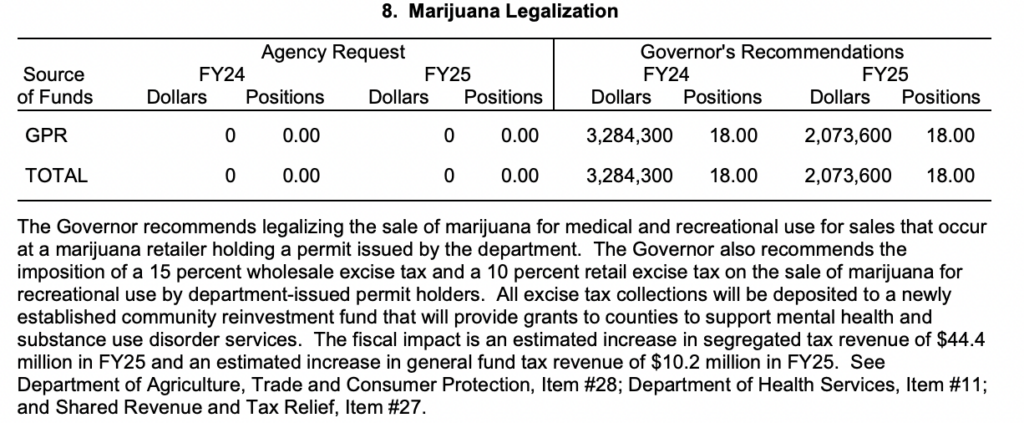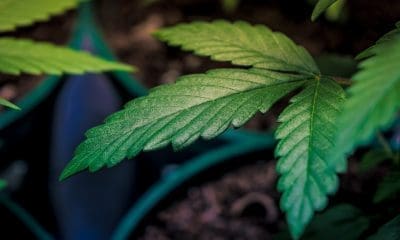Politics
Wisconsin Governor Includes Marijuana Legalization In Budget Request

The governor of Wisconsin released his biennial budget request on Wednesday, and it again includes language to legalize medical and recreational marijuana in the state.
Gov. Tony Evers (D) signaled that he planned to put the adult-use measure in his request, despite a top GOP lawmaker warning that taking that step could compromise negotiations on more modest medical cannabis legislation.
Evers made clear that he wasn’t going to be talked down from including the proposal, though, with his office pointing out that he made a campaign promise to push for comprehensive legalization and that the majority of voters in the state support the policy change.
Getting adult-use legalization through the Republican-controlled legislature would be a steep task, however.
Here are the key provisions of the governor’s marijuana legalization proposal:
Adults 21 and older who are residents of Wisconsin could purchase and possess up to two ounces of marijuana for personal use, while non-residents could have up to one-quarter ounce.
Residents 21 and older could also grow up to six cannabis plants for their own use.
People with debilitating medical conditions could qualify as medical cannabis patients.
The Department of Revenue (DOR), which called for legalization in its budget request this year, would be responsible for regulating the market and issuing cannabis business licenses.
Marijuana wholesalers would be subject to a 15 percent tax, while another 10 percent tax would be levied at the retail level for adult-use cannabis sales. Medical cannabis patients would not pay the excise tax.
Revenue from sales would go to a community reinvestment fund, which would support mental health and substance misuse treatment programs.
People would be able to petition courts for resentencing or expungement for convictions involving activity made legal under the law.
Marijuana businesses with more than 20 employees would be required to enter into a labor peace agreement.
DOR would need to implement competitive scoring in the licensing process, prioritizing applicants who demonstrate that they’ll work to “protest the environment, provide stable, family-supporting jobs to local residents, ensure worker and consumer safety” and more.
There would be anti-discrimination protections for workers who use marijuana off duty, and the bill would also eliminate THC drug testing as a condition of receiving public benefits.
For fiscal year 2025, the governor’s office is estimating that the state will generate $44.4 million in “segregated tax revenue” fro legal cannabis, as well as a $10.2 million increase in state general fund tax revenue.

Via DOA.
The governor also included adult-use and medical marijuana legalization in his 2021 budget, as well as decriminalization and medical cannabis in his 2019 proposal, but the conservative legislature has consistently blocked the reform.
—
Marijuana Moment is tracking hundreds of cannabis, psychedelics and drug policy bills in state legislatures and Congress this year. Patreon supporters pledging at least $25/month get access to our interactive maps, charts and hearing calendar so they don’t miss any developments.
![]()
Learn more about our marijuana bill tracker and become a supporter on Patreon to get access.
—
While Assembly Speaker Robin Vos (R) said last month that trying to enact adult-use legalization through the budget could “poison the well” in the legislature, jeopardizing talks on medical cannabis, the leader of the Senate has expressed that he thinks the more modest policy is feasible this session.
“Our caucus is getting pretty close on medical marijuana,” Senate Majority Leader Devin LeMahieu (R) said. “A lot of our members, who are maybe at a point where they can vote for it now, they just want to make sure it’s regulated well.”
The governor said recently that he was encouraged by the Senate leader’s remarks about nearing consensus on medical marijuana, and he’s prepared to sign such legislation as long as it’s not “flawed” by including too many restrictions.
Evers didn’t bring up his legalization proposal in his budget speech on Wednesday, but he did stress in his inaugural address last month that the state needs to have a “meaningful conversation about treating marijuana much like we do alcohol.”
Meanwhile, a new report published this month by Wisconsin Policy Forum found that 50 percent of adults 21 and older in the state live within 75 minutes of an out-of-state cannabis retailer, such as in Illinois or Michigan. That percentage stands to increase if legislative efforts to legalize marijuana in neighboring Minnesota are successful this session.
Some Wisconsin lawmakers have filed bills to legalize cannabis for adult use—and former Assembly Majority Leader Jim Steineke (R) has said legalization is “likely” to happen at some point—but the legislature has so far failed to pass even more modest proposals like decriminalization or the legalization of medical cannabis.
Ahead of the November election, Evers met with college students and urged supporters to get engaged and vote, in part to ensure that the state advances marijuana legalization.
If Democrats had won enough seats, it could have also set them up to pass a resolution that the governor recently introduced to allow citizens to put initiatives on the ballot. Advocates expressed hope that the move could open the door to finally letting voters decide on marijuana legalization, but it’s unlikely that GOP lawmakers will go along with it.
Meanwhile, voters across the state have been making their voices heard on cannabis reform over the past several election cycles. Most recently, voters in three counties and five municipalities across the state approved non-binding advisory questions on their local ballots in support of legalization.
The local votes are largely meant to serve a messaging purpose, providing lawmakers with a clear policy temperature-check among their constituents. But those that were approved will not change any laws by themselves.
A statewide poll released in August found that a solid 69 percent of registered voters in Wisconsin believe that cannabis should be legal. That includes 81 percent of Democrats, 75 percent of independents and 51 percent of Republicans.
Republicans filed a limited medical cannabis bill last year—and it got a hearing on the unofficial marijuana holiday 4/20, but that came too late in the legislative session for lawmakers to actually vote on the measure.
Other GOP members have filed bills to more modestly decriminalize marijuana possession in the state, but none of those proposals advanced.
As it stands, marijuana possession is punishable by a maximum $1,000 fine and up to six months in jail for a first offense. People convicted of a subsequent offense would face a felony charge punishable by a maximum $10,000 fine and up to three and a half years in prison.
The governor vetoed a GOP-led bill last year that would have significantly ramped up criminal penalties for people who use butane or similar fuels to extract marijuana.
And in the interim as lawmakers pursue reform, the governor has issued hundreds of pardons during his years in office, primarily to people convicted of non-violent marijuana or other drug offenses.
Photo courtesy of Brian Shamblen.
















